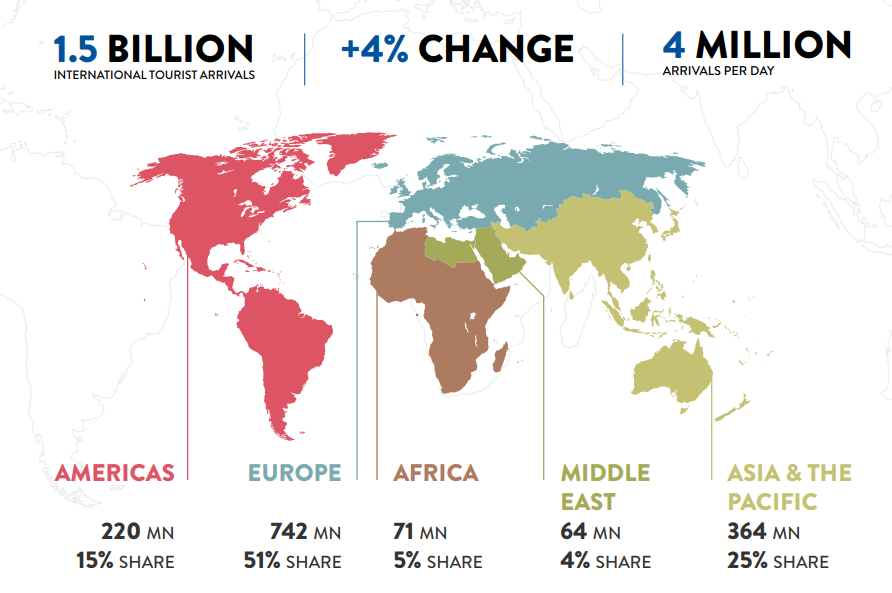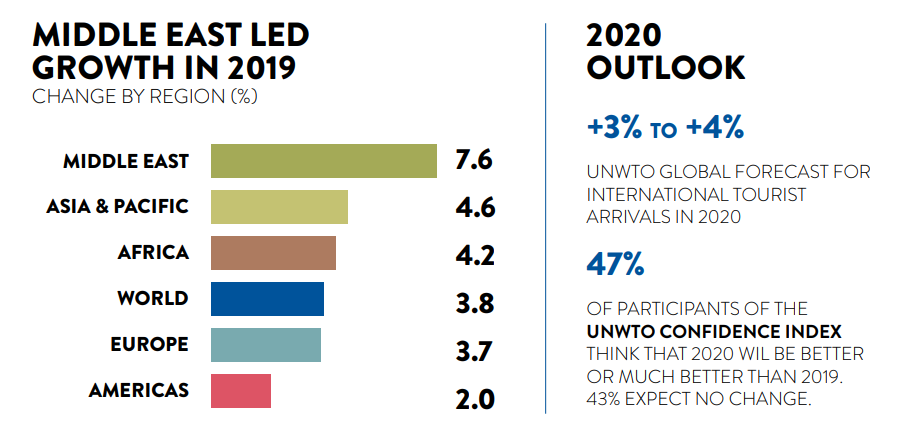A similar 4% rise is predicted for 2020 and its is now likely that its 2030 forecast of 1.8 billion could be achieved by 2026, suggesting that the organisation has been far too conservative in its growth estimations and raising further concerns with overtourism.
The latest data confirms tourism as a leading and resilient economic sector, especially in view of current global uncertainties. UNWTO notes that this calls for such growth "to be managed responsibly so as to best seize the opportunities tourism can generate for communities around the world".
All regions of the world saw a rise in international arrivals in 2019. However, uncertainty surrounding Brexit, the collapse of Thomas Cook, geopolitical and social tensions and the global economic slowdown all contributed to a slower growth in 2019, when compared to the exceptional rates of 2017 and 2018, says UNWTO. The data shows that this slowdown affected mainly advanced economies and particularly Europe and Asia and the Pacific.
Looking ahead, growth of 3% to 4% is predicted for 2020, an outlook reflected in the latest UNWTO Confidence Index which shows a cautious optimism: 47% of participants believe tourism will perform better and 43% at the same level of 2019.
The question is does perform better refer to growth ahead of forecast? If so, by how much? Major sporting events, including the Tokyo Olympics, and cultural events such as Expo 2020 Dubai are certainly expected to have a positive impact on the sector during the current calendar year.

Presenting the results, UNWTO secretary general Zurab Pololikashvili stresses that "in these times of uncertainty and volatility, tourism remains a reliable economic sector". Against the backdrop of recently downgraded global economic perspectives, international trade tensions, social unrest and geopolitical uncertainty, "our sector keeps outpacing the world economy and calling upon us to not only grow but to grow better", he adds.
Given tourism's position as a top export sector and creator of employment, UNWTO continues to advocate the need for responsible growth and says tourism has "a place at the heart of global development policies" to gain further political recognition and make a real impact in meeting sustainable development goals.
While many look to Asia for the largest growth, it was in fact the Middle East that was the fastest-growing region for international tourism arrivals in 2019, growing at almost double the global average (+8%). Growth in Asia and the Pacific slowed down but still showed above-average growth, with international arrivals up 5%.
Europe where growth was also slower than in previous years (+4%) continues to lead in terms of international arrivals numbers, welcoming 743 million international tourists last year (51% of the global market).

The Americas (+2%) showed a mixed picture as many island destinations in the Caribbean consolidated their recovery after the 2017 hurricanes while arrivals fell in South America due partly to ongoing social and political turmoil. Meanwhile, limited data available for Africa (+4%) points to continued strong results in North Africa (+9%) while arrivals in Sub-Saharan Africa grew slower in 2019 (+1.5%).
Against a backdrop of global economic slowdown, tourism spending continued to grow, most notably among the world's top ten spenders. France reported the strongest increase in international tourism expenditure among the world's top ten outbound markets (+11%), while the United States (+6%) led growth in absolute terms, aided by a strong dollar.
However, some large emerging markets such as Brazil and Saudi Arabia reported declines in tourism spending. China, the world's top source market saw outbound trips increase by 14% in the first half of 2019, though expenditure fell 4%, according to the UNWTO World Tourism Barometer.
"The number of destinations earning USD1 billion or more from international tourism has almost doubled since 1998," highlights Mr Pololikashvili. "The challenge we face is to make sure the benefits are shared as widely as possible and that nobody is left behind." This year, UNWTO is celebrating the Year of Tourism and Rural Development, aiming to deliver positive change in rural communities, creating jobs and opportunities, driving economic growth and preserving culture.
What's for sure, with the need for transparent environmental credentials, and increasing understanding of the dangers of overtourism, we are now entering a key decade for the tourism sector. Shouting about its strong performance is no longer relevant and sustainable actions will define its future.